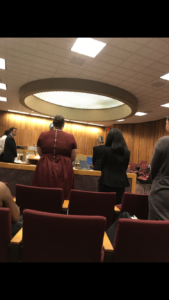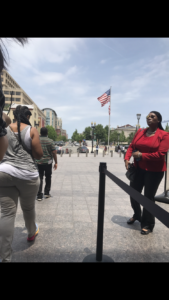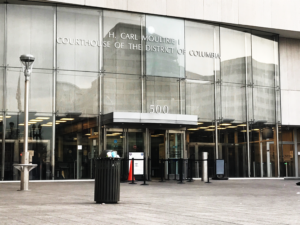By Alex Segell
Attorneys arrive in bland and expressionless suits, so passé you wouldn’t be able to remember details even if you tried. They smile at one another candidly, shaking hands or even embracing for a hug. Offering quips here and there, they make small talk and humor each other with light laughter.
 In the audience sits a family, and while it’s been years since they lost their loved one, they still wait with solemn faces. They lean forward in moments of a potential breakthrough and dismiss themselves when the evidence becomes too daunting. When the counsel continuously objects, further delaying long-awaited closure, those who knew the victim roll their eyes, scowl, or even go so far as to throw their hands in the air out of impatience. Some grab the hand of the person sitting next to them, maybe to channel their frustration less obviously or simply out of the need for comfort.
In the audience sits a family, and while it’s been years since they lost their loved one, they still wait with solemn faces. They lean forward in moments of a potential breakthrough and dismiss themselves when the evidence becomes too daunting. When the counsel continuously objects, further delaying long-awaited closure, those who knew the victim roll their eyes, scowl, or even go so far as to throw their hands in the air out of impatience. Some grab the hand of the person sitting next to them, maybe to channel their frustration less obviously or simply out of the need for comfort.
Nobody acknowledges my presence, as I sit in the back row quietly scribbling and slowly shifting in my seat every so often. I am a new set of eyes, an inexperienced observer, and I listen to the intimate details of someone’s last moments on this earth. I sit near the families, unnoticed, and wait for the same details. The goal is to report, to inform, and to remain objective. With only a few hearings and a trial under my belt, it has proven difficult to remain objective at times. A mother giving a testimony about the love she had for her daughter, or a father who sits in the audience and wears a jersey bearing the name of his son can easily provoke emotion. I am a fly on the wall while others endure a tragedy that cannot be fixed with a conviction. 
D.C. alone has experienced 49 homicides this year, and counting. That’s 49 families whose entire lives have been flipped on their head in a matter of seconds. More importantly, that’s 49 deaths that the general public will never know about nor care about. I sit and I scribble for the sake of the family, and for the off chance someone is interested in a death that occurred in a Southeast neighborhood of D.C. I listen to the details so that there is a legible and sincere record of someone’s life and their demise – so that people might pay attention. But my presence does not change the fate of the victim, or the sorrow of the family, or the process of the trial. I am a third-party outsider, with no connection to anyone who sits in the room, but I involve myself deeply in a way that only I am aware of.
While it may seem like I am too emotionally unsound to sit through a homicide trial and appreciate it for everything that it is, I mean to say the opposite. It is a surreal experience, to say the least, to listen to such intimate details, to be exposed to lives that I knew nothing of before, and to be there when questions are finally answered. A family in a murder trial will not notice me, nor will the attorneys, the judge, or law interns who sit more confidently in the front. I am not a significant actor in the eyes of those who are so personally affected by this case, and at times I feel guilty for being there. But the work that is being done by the notes that I take, and by sitting unobserved, holds the possibility of affecting those so personally tied to the case in a way that gets them closer to closure.

 Going to court is not what TNT movies make it out to be. There’s not a mass crowd in the room, there’s no gavel calling for attention or crowd outbursts. As an intern for a homicide tracking blog, I’ve had the honor of going to court almost everyday and let me tell you there is definitely a break between reality and fiction.
Going to court is not what TNT movies make it out to be. There’s not a mass crowd in the room, there’s no gavel calling for attention or crowd outbursts. As an intern for a homicide tracking blog, I’ve had the honor of going to court almost everyday and let me tell you there is definitely a break between reality and fiction.